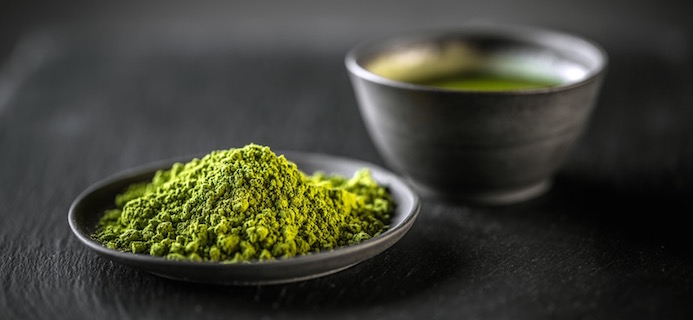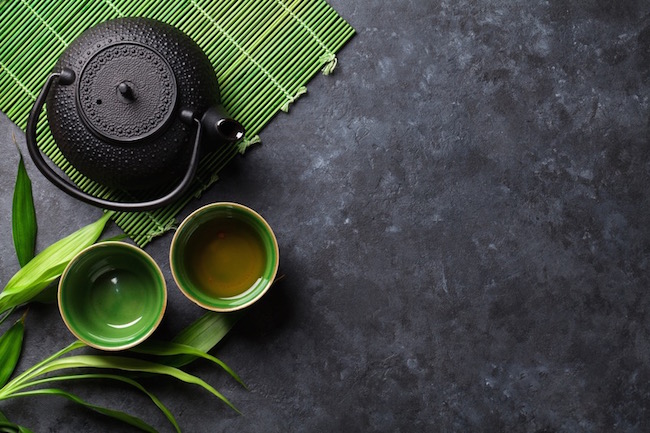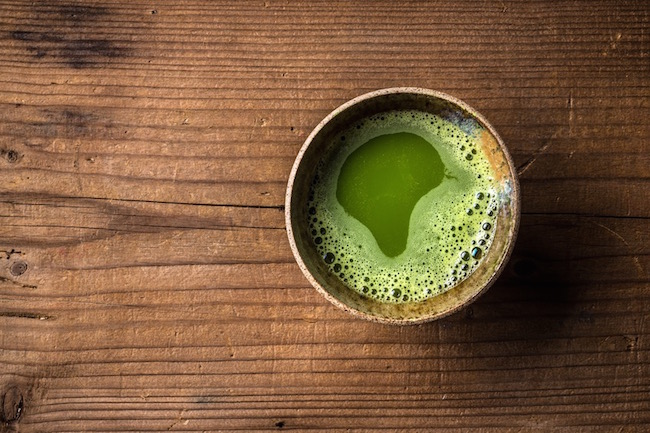From improving weight loss to boosting memory, there’s good evidence that drinking matcha green tea is one health trend with the backing of science
When it comes to improving your health through your diet, matcha green tea is THE drink of the moment, and has fast become the ultimate must-have morning cuppa for health-conscious celebrities and nutritionists. And all for good reason. Green tea – and matcha tea in particular – has been shown to have health benefits that go above and beyond those of regular tea or coffee. Looking for a healthier morning pick-me-up that won’t give you the crash coffee does by 11am? You may have just found it.
What is matcha tea?
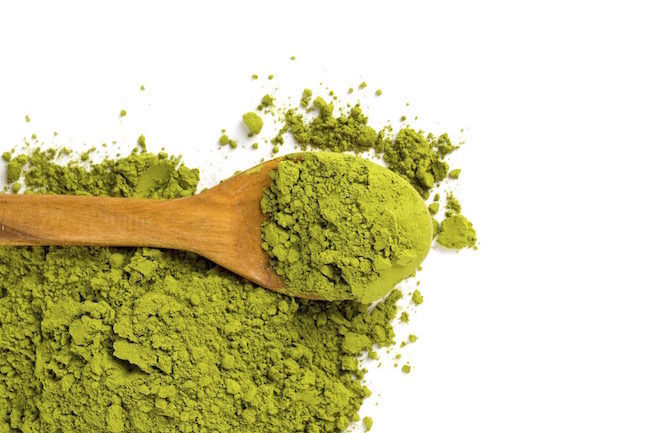
Matcha tea is a type of green tea in a powdered form. It originates from Japan, where it’s best known for its use in tea ceremonies.
Matcha, other green teas and regular (black) tea are actually made from the same plant – Camellia sinensis.
Most green teas are simply made by steaming fresh Camellia leaves, but making matcha tea involves a more complex process. It’s made only from the fresh leaf tips.
Matcha, other green teas and regular (black) tea are actually made from the same plant – Camellia sinensis.
The plants are shaded from the sun between the time when the new leaf shoots start to appear and when they are picked. The shade is said to increase the content of chlorophyll and other nutrients, including the amino acid L-theanine (more on L-theanine below).
MORE: Could detox teas harm your health?
After picking the best leaves, they’re steamed, gently air-dried, and then ground into a fine powder, removing any fibres.
What’s so magical about green tea… and matcha?
1. Antioxidant benefits
The primary health-boosting quality of green tea is undoubtedly its content of antioxidants. These include a type of flavonols called catechins, of which the most abundant is epigallocatechin gallate (EGCG). Catechins have been found to have anti-inflammatory activity, anti-cancer and anti-aging properties amongst others (we’ll have a closer look at some of these benefits below).
Catechins in matcha green tea have been found to have anti-inflammatory activity, anti-cancer and anti-aging properties amongst others
Although both regular tea and green tea contain antioxidant substances, research has found that green tea contains higher amounts of catechins in particular. In fact, a study carried out on teas bought from supermarkets in the UK found that you could get up to 400mg of catechins by drinking three cups of green tea, but less than 100mg from regular or black tea.
However, matcha trumps them all. A study carried out at the University of Colorado found that the content of the catechin EGCG available in a cup of matcha can be over 100 times greater than that found in a standard China green tea.
2. Improving metabolism and supporting weight loss
If you’re trying to slim down, green tea could also be your new best friend. Research has found that green tea in particular may be helpful for supporting metabolism and weight management.
For example, in a study carried out with 35 obese men and women, it was found that those who drank four cups of green tea daily for two months lost significantly more weight than those who consumed a placebo.
In another trial on 10 men, it was found that when the men consumed green tea extract in the morning they had a four per cent higher energy expenditure over 24 hours (i.e. they burned four per cent more calories) than when consuming a placebo.
Those who drank four cups of green tea daily for two months lost significantly more weight than those who consumed a placebo.
When the men took caffeine only (the same amount as found in the green tea), this had no effect, indicating that it’s not just the caffeine at work.
In fact, green tea may support weight loss in several ways: increasing thermogenesis (calorie burning), increasing fat oxidation (burning of fat for energy), reducing fat absorption, and even reducing appetite.
MORE: 6 weight loss smoothies that WON’T leave you hungry
3. Feeling stressed? Swap your coffee for green tea
Most of us have plenty of stress in our lives. When we feel tired or drained – often as a result of the stress itself – we reach for coffee to give ourselves an energy boost. But high doses of caffeine and other stimulating substances found in coffee can actually cause our body to make more stress hormones, further increasing the stress response. That’s one of the reasons we may feel jittery and ‘on edge’ after a strong coffee. It’s a vicious cycle.
Green tea does contain some caffeine, but less than coffee. The primary reason that tea is a better choice when we’re stressed is thanks to its content of a natural substance called L-theanine, which is virtually unique to the tea plant.
High doses of caffeine and other stimulating substances found in coffee can cause our body to make more stress hormones
L-theanine has been found to have a relaxing effect on the mind, reduce anxiety, and help with focus and concentration. It’s thought to do this by increasing alpha waves in the brain, which are associated with being ‘calm but alert’ – i.e. increasing relaxation without causing drowsiness.
And here’s the best news: matcha green tea in particular is said to have a high percentage of relaxing theanine. So swap your coffee for a matcha tea or matcha latte in the morning – you should feel more alert without getting the jitters.
MORE: 5 stress symptoms and EXACTLY how to fix them fast
4. Anti-ageing: memory and brain health
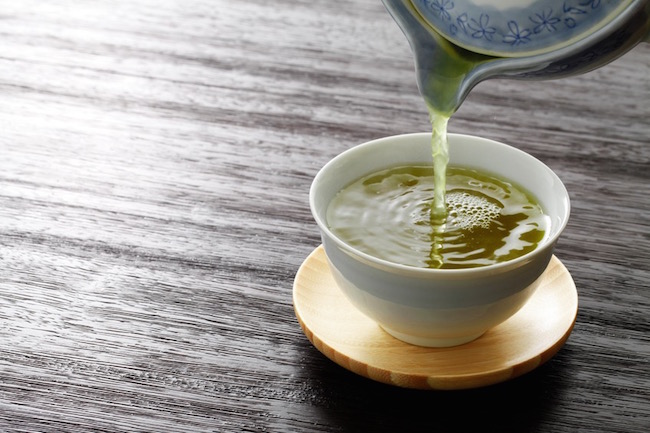
Want to stay ‘on the ball’ as you get older? Well, drinking green tea could help here too. Studies have suggested that catechins in green tea can reach the brain and help protect the neurons (nerve cells), and reduce decline in brain function.
Green tea may specifically help to prevent Alzheimer’s disease, one of the primary causes of memory loss.
Green tea may specifically help to prevent Alzheimer’s disease, one of the primary causes of memory loss
To get technical for a moment, it’s been reported that the catechins in green tea can help prevent the build-up of amyloid plaques, and also help reduce accumulation of phosphorylated tau proteins – these are two of the processes that occur in Alzheimer’s disease and lead to decline in memory and cognitive function (thinking, reasoning, learning, etc.).
MORE: 24 chemical-free beauty treats
And it may be not only the catechins at work in protecting our memory. Studies also suggest that L-theanine, the ‘relaxing’ amino acid in green and matcha tea, may have benefits for memory and reducing decline in cognitive function as we get older.
5. Maintaining bone strength

Green tea may be particularly beneficial for our bone strength too.
Although studies find that both black and green teas may be supportive, many more studies have shown benefits of green tea.
It’s been found, for example, that EGCG can decrease our numbers of osteoclasts – the cells that break down bone; and increase the numbers and activity of osteoblasts – the cells that build bone.
So drinking green and matcha tea is also a great choice for anyone who wants to build their bone strength or prevent bone loss.
MORE: 12 healthy foods that look like the body part they’re good for
This is often a particular concern for women after menopause who need to protect themselves against osteoporosis.
Green tea may also be helpful if you need to speed up the healing process of a broken bone.
6. Green tea for a healthy mouth and fresh breath

Want a healthier mouth? This amazing drink has shown promise to help keep our teeth and gums healthy, and reduce bad breath.
Among the specific research findings, green tea has been shown to have potent anti-bacterial activity against several of the bacteria that cause gum disease and tooth decay.
MORE: The truth about bad breath
In the form of a mouthwash, it’s been found to help reduce plaque and gum disease, including in a recent study carried out on 110 men.
Lastly – and perhaps most significantly for many people, several studies have found that green tea can help reduce bad breath (halitosis) thanks to its natural disinfectant and deodorant activities.
7. Reducing skin ageing

And if you’re still not convinced, drinking green tea could also be beneficial for our skin, including preventing skin ageing and improving skin condition.
In a study of 60 women aged 40 to 65, half the women were given a green tea drink, and the other half a ‘control’ (placebo) drink every day for a total of 12 weeks.
In the women who had drank the green tea, their skin showed 25% less redness in reaction to a dose of UV radiation (i.e. simulating sunlight) after 12 weeks in comparison to the non-green tea group.
MORE: 10 best sunscreens for under makeup, during exercise and on a budget
This suggests that active substances in green tea reach the skin and provide protection against the damaging effects of sunlight.
What’s more, the women who drank the green tea also had improvements in their skin elasticity, and reduction in roughness and scaling.
Why go organic?
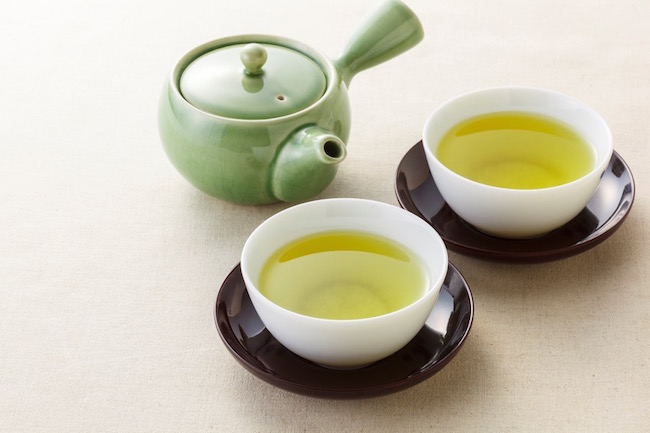
There’s also another factor to take into account when choosing a tea: the benefits of going organic.
The importance here is not what organic tea does give you, but what it doesn’t give you: potentially high levels of harmful pesticides.
Reports carried out by Greenpeace on standard (i.e. non-organic) teas from India and China found that they can contain significant levels of pesticide chemicals.
The India report found that 59% of the tea samples – including some from popular brands on sale in Europe – contained traces of more than 10 pesticides, and that a similar number contained at least one pesticide at levels above the maximum safety levels set by the EU.
reports carried out by Greenpeace on teas from India and China found that they can contain significant levels of pesticide chemicals
The Chinese report found that all the samples tested contained at least three types of pesticides, and that the majority contained pesticides that may impair fertility and harm unborn children .
What’s more, these pesticides are not simply flushed from the body in urine; some have been found to build up in our fatty tissue and cause damage years or even generations down the line.
MORE: Are you addicted to sugar?
So despite all its proposed benefits, your non-organic tea (green or otherwise) could be doing you – and your children – more harm than good.
In contrast, teas produced to EU organic standards such as those of the Soil Association rarely contain pesticides. So you can be assured that you’re getting more of the fantastic benefits of green tea by going organic. And of course, organic standards also benefit the environment, the lives of the growers and workers producing the tea.
The Healthista verdict
From supporting your metabolism to maintaining a sharp memory, healthy teeth and bones, and even great skin, it’s clear that green tea – and matcha tea in particular – can be a good choice.
Perhaps most importantly for many of us, green tea can help to bring calm and focus to our lives instead of increasing our already-high stress levels, as coffee can. And going organic helps to make sure we’re getting all of the amazing benefits of green and matcha tea while avoiding potentially harmful chemicals… and while benefitting the environment.
We love:
Our choice is definitely Pukka’s new range of matcha teas, including Ginseng Matcha Green for energy, Mint Matcha Green for digestive health and Clean Matcha Green for cleansing. All the Pukka Matcha teas cost £2.79 for a box of 20 tea bags and are available from Sainsbury’s stores nationwide. Visit pukkaherbs.com for further information and purchase at a special price of £2.
MORE: How to make your body clock work for you
MORE: 10 ways sleep perfectionism is keeping you awake
MORE: 10 best healthy restaurants to get you beach-body ready
Like this article? Sign up to our newsletter to get more articles like this delivered straight to your inbox.



